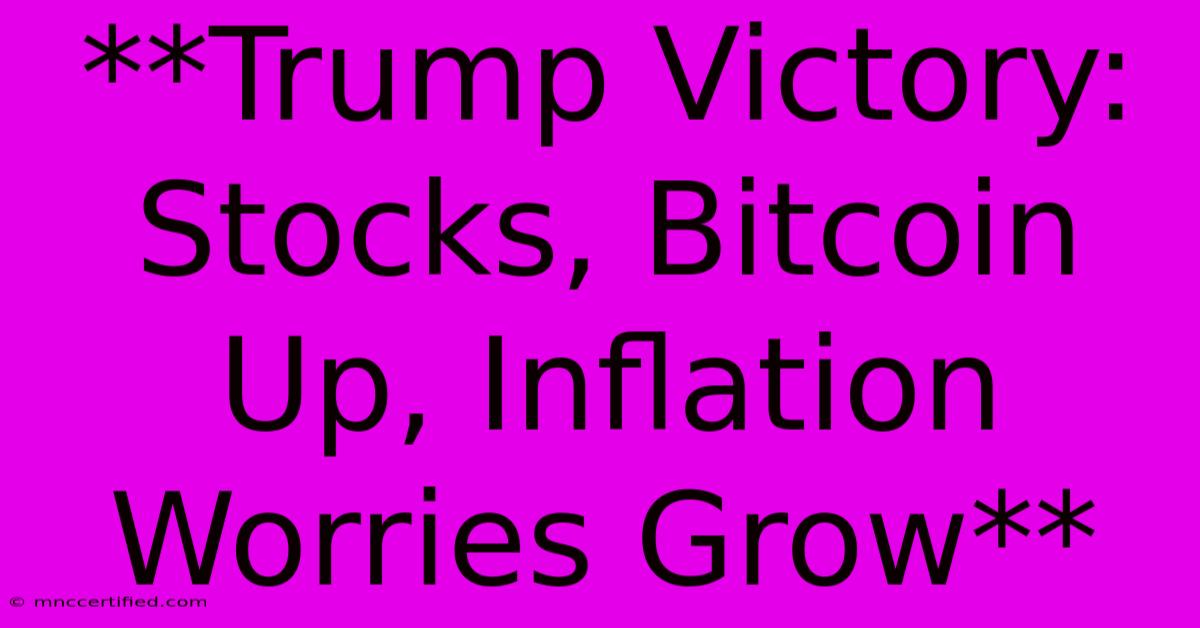**Trump Victory: Stocks, Bitcoin Up, Inflation Worries Grow**

Table of Contents
Trump Victory: Stocks, Bitcoin Up, Inflation Worries Grow
The unexpected victory of Donald Trump in the 2020 US presidential election sent shockwaves through the global markets, with stocks and Bitcoin surging while inflation concerns intensified. This article will delve into the market reactions, analyzing the potential impact of a Trump presidency on the economy and the reasons behind the contrasting trends in various asset classes.
Stocks Soar on Hopes of Deregulation and Tax Cuts
The stock market responded positively to Trump's win, with major indices like the Dow Jones Industrial Average and the S&P 500 experiencing significant gains. This bullish sentiment was primarily driven by expectations of pro-business policies, including tax cuts and deregulation. Investors anticipated that a Trump administration would create a favorable environment for corporate growth, potentially boosting profits and shareholder value.
Key factors contributing to the stock market rally:
- Tax Cuts: Trump's campaign promises included substantial tax cuts for businesses and individuals, which could lead to higher corporate earnings and increased consumer spending.
- Deregulation: The prospect of loosening regulations on businesses, particularly in the financial sector, was seen as a positive development for corporations, allowing them to operate with more flexibility and potentially increasing profitability.
- Infrastructure Spending: Trump's plans for massive infrastructure spending were perceived as a potential catalyst for economic growth, boosting demand in various sectors.
Bitcoin Takes Flight on Unconventional Monetary Policy
Bitcoin, the leading cryptocurrency, also witnessed a significant price surge following Trump's victory. While the exact reasons for this correlation are debated, some analysts believe that Bitcoin's surge was fueled by uncertainty about the future of the US dollar under a Trump administration.
Possible explanations for Bitcoin's rise:
- Potential for Dollar Weakness: Trump's unconventional economic policies, including potential protectionist measures, raised concerns about the dollar's stability. This could have driven investors towards Bitcoin as a potential safe haven asset.
- Increased Interest in Decentralized Finance: The rise of Bitcoin could also be linked to a broader shift towards decentralized finance (DeFi) and a growing interest in alternative financial systems.
Inflation Concerns Emerge as a Counterpoint to Market Optimism
Despite the positive reactions in the stock and cryptocurrency markets, concerns about rising inflation emerged as a potential downside risk. Trump's proposed policies, such as increased infrastructure spending and potential trade barriers, could lead to higher prices for goods and services.
Factors contributing to inflation concerns:
- Increased Government Spending: Trump's infrastructure plans could lead to a surge in government spending, potentially increasing the money supply and driving up prices.
- Trade Wars: Trump's protectionist trade policies could lead to higher tariffs and import costs, ultimately pushing up prices for consumers.
- Potential for Higher Interest Rates: The Federal Reserve might be forced to raise interest rates to combat inflation, which could slow down economic growth.
Conclusion: A Mixed Outlook for the Economy Under Trump
The early days following Trump's victory saw a mixed reaction in the markets, with optimism driven by potential pro-business policies countered by concerns about inflation. While the long-term impact of Trump's presidency on the economy remains uncertain, his policies will undoubtedly have a significant influence on the trajectory of stocks, Bitcoin, and the broader financial landscape.
Investors and analysts will need to closely monitor economic developments and policy changes to navigate the evolving market environment and assess the true impact of a Trump presidency.

Thank you for visiting our website wich cover about **Trump Victory: Stocks, Bitcoin Up, Inflation Worries Grow**. We hope the information provided has been useful to you. Feel free to contact us if you have any questions or need further assistance. See you next time and dont miss to bookmark.
Featured Posts
-
Stranger Things Season 5 Release Date Episode Titles Confirmed
Nov 07, 2024
-
Happy Investment Mortgage Broker Fresno Ca
Nov 07, 2024
-
Singapore Startups Ai Powered Coffee And Milk
Nov 07, 2024
-
S And P 500 Dow Hit Record Highs On Trump Win
Nov 07, 2024
-
Large Group Health Insurance Underwriting
Nov 07, 2024